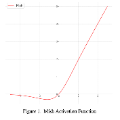Recent research has explored the implementation of privacy-preserving deep neural networks solely using fully homomorphic encryption. However, its practicality has been limited because of prolonged inference times. When using a pre-trained model without retraining, a major factor contributing to these prolonged inference times is the high-degree polynomial approximation of activation functions such as the ReLU function. The high-degree approximation consumes a substantial amount of homomorphic computational resources, resulting in slower inference. Unlike the previous works approximating activation functions uniformly and conservatively, this paper presents a \emph{layerwise} degree optimization of activation functions to aggressively reduce the inference time while maintaining classification accuracy by taking into account the characteristics of each layer. Instead of the minimax approximation commonly used in state-of-the-art private inference models, we employ the weighted least squares approximation method with the input distributions of activation functions. Then, we obtain the layerwise optimized degrees for activation functions through the \emph{dynamic programming} algorithm, considering how each layer's approximation error affects the classification accuracy of the deep neural network. Furthermore, we propose modulating the ciphertext moduli-chain layerwise to reduce the inference time. By these proposed layerwise optimization methods, we can reduce inference times for the ResNet-20 model and the ResNet-32 model by 3.44 times and 3.16 times, respectively, in comparison to the prior implementations employing uniform degree polynomials and a consistent ciphertext modulus.
翻译:暂无翻译



